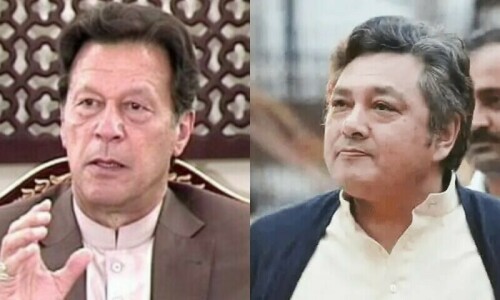ISLAMABAD: Counsel for PTI leaders Imran Khan and Shah Mehmood Qureshi on Monday raised questions over the conduct of former principal secretary Azam Khan in the cipher case.
An Islamabad High Court (IHC) division bench, comprising Chief Justice Aamer Farooq and Justice Miangul Hassan Aurangzeb, took up the bail pleas of the former prime minister and foreign minister who were sentenced to 10 years in the cipher case.
Barrister Salman Safdar argued that Mr Azam — the prosecution’s star witness in the case — allegedly went missing for about a month and only reappeared after the case’s First Information Report (FIR) was registered.
As per the counsel, Azam Khan as well as former finance minister Asad Umar were being probed in the case.
Argues ex-bureaucrat gave differing statements in cipher case; MNA Dogar expects PTI leaders’ ‘acquittal’ today
However, the former bureaucrat did not seek a pre-arrest bail when he was called by the FIA to record his statement before the investigation officer under Section 161 of the CrPC.
Mr Safdar argued that the prosecutor’s witness also testified before a magistrate under Section 164, but the statement before the Special Court was slightly different from what he had testified earlier.
When Justice Aurangzeb asked what was attributed to Mr Azam, the counsel replied that he was allegedly directed to prepare minutes of the meeting after receiving the cipher sent by the then ambassador to the US.
Barrister Safdar argued that the FIR levelled specific allegations against Mr Khan and Mr Qureshi because of their public statements regarding the cipher.
He recalled that the IHC denied post-arrest bail to the two PTI leaders, but the decision was overturned by the Supreme Court with some observations.
He pointed out that after the dismissal of Mr Qureshi’s bail plea, the IHC directed the court to conclude the trial in four weeks.
The trial court judge, the lawyer argued, “religiously followed” the directive and recorded the statements of 25 witnesses in one day despite the fact that IHC had earlier scrapped the case proceedings twice because of serious legal loopholes.
He argued that the judge even closed the defendants’ counsel’s right to examine the witnesses and appointed a state counsel for cross-examination.
The Official Secrets Act could be invoked for sharing sensitive information with the enemy state. However, the ex-PM and foreign minister were convicted under this law, which was unprecedented, Barrister Safdar argued.
Justice Farooq observed that the Act is over a century old, and parliament could have amended it to remove outdated sections. Later, the court adjourned proceedings till Tuesday (today).
Imran’s decision to join SIC
While talking to media outside the IHC, PTI MNA Malik Amir Dogar expressed hope that PTI leaders would be “acquitted” today.
He said the judges’ observations during the detailed hearing on Monday indicated that the case is nearing conclusion.
He also commented on the decision of PTI-backed winning candidates to join the Sunni Ittehad Council and said it was taken with Imran Khan’s permission.
Published in Dawn, March 19th, 2024












































